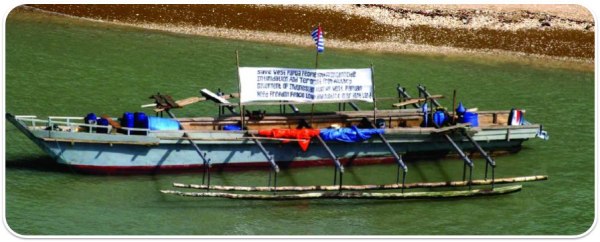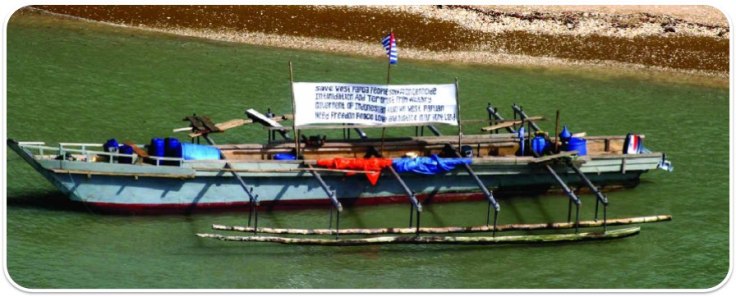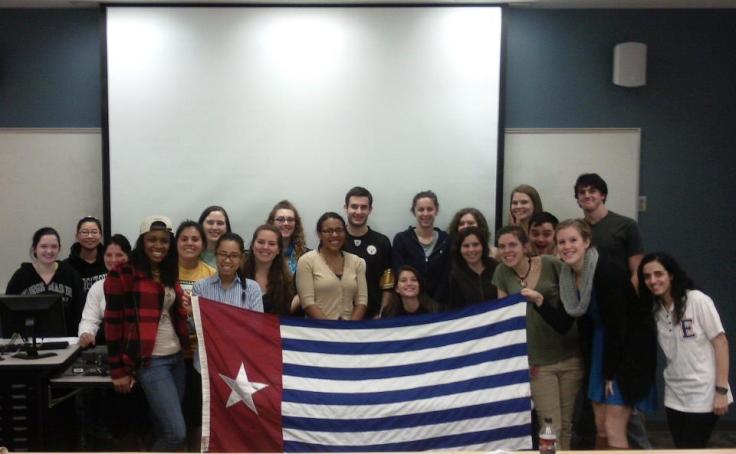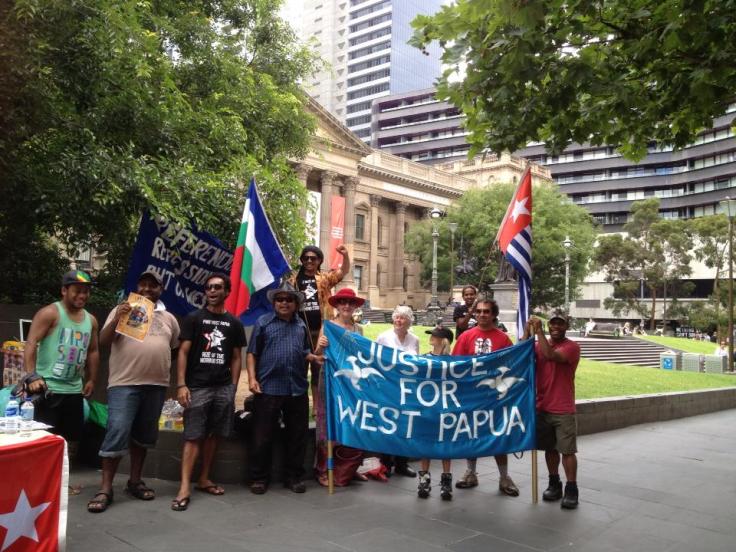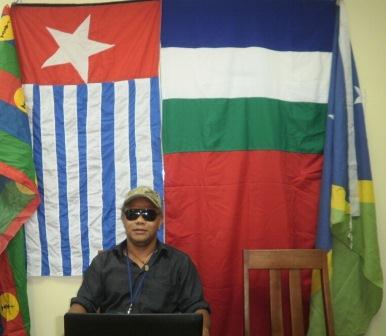Published in Partnership between West Papua Media and AWID
Source: AWID
August 9, 2013

FRIDAY FILE: After 42 years of Indonesian rule, women in West Papua continue to fight for their freedom and peace.
By Rochelle Jones
West Papua – officially under Indonesian rule since 1963 – is located in the Western half of the island of New Guinea – 250km north of Australia. In 2012, West Papua Media conducted interviews with four West Papuan women who are active in the nonviolent movement for freedom. Here, AWID gives some background, and excerpts from the interviews.
Act of No Choice
The Australian-based Free West Papua describes how during the 1950s, West Papua was under Dutch Colonial rule, but by 1961 were moving towards independence with their own flag, the ‘Morning Star’, and Papuan government officials. In the early sixties, however, “Conflict erupted over West Papua between The Netherlands and Indonesia, and a United Nations agreement gave control of the colony to Indonesia for six years. This was to be followed by a referendum. These six years of Indonesian control saw well-documented cases of violence and abuse by the military. Then in 1969, Indonesia conducted a sham referendum called the Act of Free Choice. Only 1025 Papuans, representing a population of one million, were picked to vote. Under severe duress, including threats from senior ranking military officials to cut their tongues out, they voted to remain part of Indonesia. Despite a critical report by a UN official who was present, citing serious violations, the UN shamefully sanctioned the vote and West Papua officially became a part of Indonesia. Papuans call this referendum the ‘Act of No Choice’”
With a track record of denying foreign journalists access to West Papua (or arresting and deporting them) – the Indonesian government continues its stronghold over this resource-rich region. A stronghold held together largely by the presence of the Indonesian military¾which are known for their violence enacted with impunity, but also by the silence of the international community. Free West Papua estimates that “since 1962, 100,000 people have been killed or disappeared by the brutal military regime. Thousands have been raped and tortured and entire villages, especially in the highlands, have been destroyed.” In May this year, West Papua Media published one disturbing report of recent killings and rapes, perpetrated by the Indonesian military.
Tragically, reports such as these are part of every-day life for West Papuans, who are of Melanesian descent and culturally different from Indonesians. Resistance to Indonesia’s occupation has existed from the beginning – but the military has repeatedly responded with violence and intimidation. Whilst more information is getting out about West Papua and international concern grows over the human rights situation, this can be marred by politics and economics, with governments hesitant to upset Indonesia. In recent years a new independence organisation, the National Committee for West Papua (KNPB) has held “huge independence rallies… across West Papua and the West Papuan’s voice is united more than ever.”
Women in the struggle
Asked why they joined the nonviolent movement, Fanny Kogoya, Rini Tabuni, Heni Lani and Ice Murib (1), the women interviewed by West Papua Media, each recount experiences of injustice, disrespect and the violence of growing up in a land without freedom. Murib highlights the simplicity of their struggle: “We want to be free. We want you to help us be free. Indonesia doesn’t care about us as people. So the only thing that we want is to be free…to live our own life in our own land.”
Kogoya says: “As a child I often saw people beaten-up by the police, without any reason at all… As a student I started to compare government policies with what was actually happening… On the one hand you had the constitution, which talked about freedom and the Pancasila, which talked about social justice, but in reality there was very little political space for us Papuans. When I was living in Java I could compare the health and education system with what we had in West Papua and it was just so different…There is very little political difference for Papuans before or after [the regime of] Suharto… Papua has yet to experience a real democratic space. These kinds of things make me really emotional. I realized I had to resist. I can’t be silent.”
Tabuni recalls: “my father was one of the victims of 1977. Indonesian soldiers cut open his chest with knives. They took out the contents of his stomach and they removed his heart. My grandfather saw this happening with his own eyes. As the soldiers were cutting open my father’s chest they were saying, “Where is your God now? Who is here to save you?” Tabuni explains how freedom activist Benny Wenda, now living in exile in the UK, inspired her after her family lived in Jayapura with Wenda’s people: “In 2000 Benny started to become more active… [and was granted] refugee status in England. We watched… how he continued to struggle. That inspired those of us who lived inside Papua to continue to struggle… It was in this context that the KNPB entered. My friends and I said let’s stay with this organization, let’s sit down with them and see what we can do together.”
After witnessing countless events as a young girl, like the arrest of her father, Lani recounts her political awakening as a student when she was told about the history of West Papua’s struggle: “Before [this] it was like I was sitting in this small dark room with little rays of light coming through. These rays of light were like my father getting arrested and Benny Wenda getting arrested. When I got my education it was like the door of this room was flung open… I went outside for the first time and saw what was really happening. The day on the beach in Hamadi was the first time I saw the Morning Star flag. I grabbed it and held it. Finally, I realized, I’m not an Indonesian, I’m a Papuan!”
However, there is a struggle within the movement. Kogoya describes it as a “double challenge” that women face: “We struggle against Indonesia but we also struggle against patriarchy in the movement. See we have two enemies: the way women are treated within the movement and the evil and injustice of the state. We are definitely fighting against some of the men within the movement who think we aren’t capable.” To that, however, Lani says “Women are in leadership positions and telling men what to do, so we’re already there… playing positions of leadership in the movement.”
Ongoing nonviolent resistance
Living with such violence and oppression, the women still agree that nonviolent resistance is the way forward, and yet they also admit to thinking about taking up arms. One of the obvious barriers to taking up an armed struggle is the sheer strength of the Indonesian military. Kogoya says “Even though we’re struggling nonviolently the Indonesian state continues to respond violently. They arrest people, beat people, kill people. Often my activist friends say, “What’s the point? If we struggle nonviolently they’re going to beat us, arrest us … if we struggle violently they’ll do the same things. Often people join the armed struggle because… they’ve had these traumatic experiences and… it’s an emotional reaction. Of course in our culture we also have a history of fighting back… of tribal warfare. We are a courageous people. So with these three things – our memories of suffering, our history and culture, and our courage – armed struggle is a real option for us….But Papuans are also a very practical people. We know civil resistance can also work. So my dream is to learn more about civil resistance.”
Tabuni understands why people would want to respond with violence, however, she says: “If I struggle through violence I am going to experience a number of problems. I’m going to lose a lot of my rights. I’m going to lose my best friends. And people are going to… steal my land and kill me… But now I see that there’s an opportunity to resist through nonviolent struggle. People at the grassroots need to know that nonviolent action can be really successful… We can learn from the examples of other countries.”
How can the international community help?
To be an independent nation is the goal for West Papua¾freedom from Indonesian rule and its associated violence. But this is also a struggle for culture and for the environment. Lani says since she joined the struggle “my friends have been arrested, some have died in jail, some have fled to Papua New Guinea. It’s like we are migrants in our own land. So many people from Java, from Sulawesi, from Sumatra have come to our land.” Large scale migration of Indonesians into West Papua has the potential to unthread the very fabric of their culture and existence – and the mining and deforestation of pristine forests threatens to destroy the environment as well.
To achieve freedom these women stress the need for as many people as possible to stand in solidarity. Kogoya says they need the support of environmental groups around the world to join the struggle, adding “We need institutional support. And we want people to campaign about Papua to stop the violence… We really need technical assistance with media. We also need to influence other countries, particularly the U.S.”. Lani’s message is “for all the Papuan people to be involved in the civil resistance struggle. We have to work together.” She adds “Tell your friends in Australia and the U.S., ‘Stop sending military weapons to Indonesia. Stop.’ Because whenever we do things we face the military with those arms, and those arms are sent by your countries. The military are being trained by your countries to kill us.”
Read the full interviews here: “We Want To Be Free”: An Interview With Four Women From The West Papuan Movement For Freedom
For more information:
Visit West Papua’s Independent Human Rights Media: https://westpapuamedia.info/
Read the Enough is Enough report (testimonies of women from West Papua) from the International Center for Transitional Justice.
Read the latest HR report from the International Coalition for Papua
NOTES:
1) “We want to be free”: An interview with four women from the West Papuan Movement for Freedom. Interview by Alex Rayfield and Claudia King from West Papua Media. Photos taken by Javiera Rose.
Related articles
- West Papuan women ‘shield’ activists as rally forcibly dispersed by police (westpapuamedia.info)



